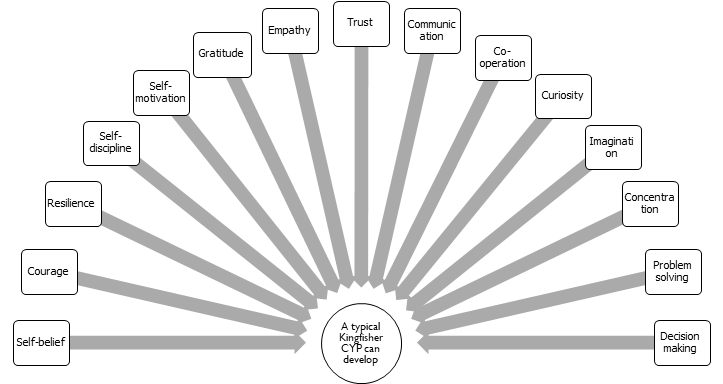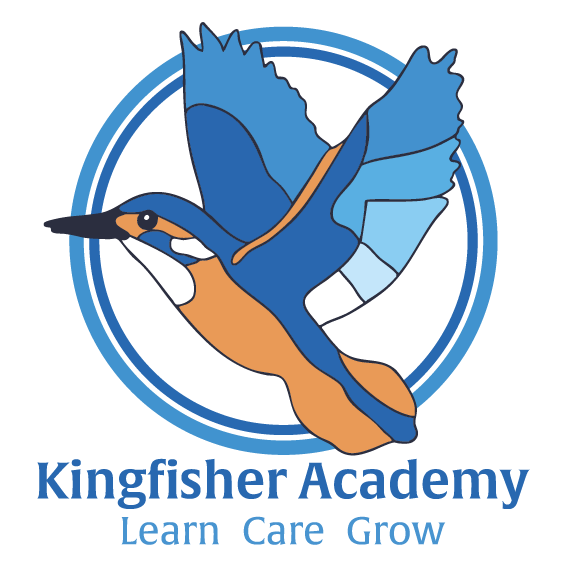Curriculum
Our Curriculum Vision
At Kingfisher Academy, we work with children and young people (CYP) who are medically too unwell to attend school due to physical or mental illness. Kingfishers hold symbolic meaning in various cultures; in some they represent peace, protection and calmness and, significantly, they have also been associated with resilience and healing. Our school values of Learn, Care and Grow are reflected in this symbolism and one of the ways we achieve this is through our curriculum offer.
At Kingfisher Academy, whilst our aim is to provide all our students with a broad and as balanced curriculum as possible, that is fit for purpose in today’s society, we also want to provide a curriculum that enables them to build emotional resilience, overcome barriers which they may have previously experienced, and lay the foundations necessary to support them in their next steps.
Our Curriculum Aims
The curriculum at Kingfisher Academy is personalised to meet the needs of all individuals. We recognise that our CYP will join us at varying times over the course of an academic year, and inevitably come to us with different gaps in their learning. We essentially have a very transient population of CYP across most of our provisions. Whilst the curriculum is meticulously planned, it is essentially bespoke to the CYP in our care and responsive to their needs.
The school’s curriculum policy is based on the following aims:
- Every pupil will be provided with an accessible pathway which enables them to achieve the best possible outcomes they can.
- CYP will be provided with an offer which compensates for gaps in learning which may have accumulated over time or as a result of a particular episode of ill-health.
- CYP develop the necessary literacy and numeracy skills necessary for their future.
- The curriculum will re-engage CYP and foster a love of learning, giving them the opportunity to secure knowledge and skills in a range of subjects, taught where possible, by subject specialists.
- The curriculum will be as broad and balanced as possible, whilst providing CYP with the necessary opportunities to develop their self-esteem and resilience.
- The curriculum will provide access to a range of cultural experiences and opportunities within and beyond the classroom, where possible, which they otherwise might not have the opportunity to access.
Outcomes
The curriculum at Kingfisher Academy is crafted to provide students with subject knowledge (access to ‘the best of what has been thought and said’, Kirschner et al., 2006) and the key skills and qualities required to ensure success in their future.
The diagram below outlines the skills and qualities that the curriculum aims to develop in CYP, in addition to subject knowledge.

Model
At Kingfisher Academy, our offer is responsive to the CYP’s needs and how they present, in light of their health and wellbeing. We have three Education Pathways and adjustments are made to the offer, depending on where a CYP is. The pathways are:
- Stabilisation — where a child is unable to focus on a full-time education package. The focus here is establishing initial relationships, creating familiarity and stabilisation and using a smaller number of staff.
- Engagement — due to mental or physical health, they are not yet ready for a full timetable. Sessions might be shorter, they may follow a bespoke timetable prioritising subjects of interest for example.
- Learning — the CYP will be able to follow an academic pathway that is matched to their capabilities. Here the focus is more on academic progress and readiness for transition.
Content and Sequencing
Our curriculum content takes care to fill gaps and build bridges for our CYP. Subjects start with the question of what a pupil needs to know and how they need to be able to apply this – what does the educated pupil look like and how do we build towards that?
Curriculum Leaders (CLs) and subject specialists consider what the overarching concepts are that a CYP needs to grasp. These key concepts and an understanding of how knowledge manifests in each subject, drive the content and sequencing choices that CLs must take. They then think about the content, the specific examples – the flesh and muscle (Turner, 2026).
The decisions around content coverage are made by subject specialists, who are best placed to make content selections based on how we develop schemata of knowledge for that particular subject in our pupils. Content choice is also driven by the principles outlined above and the gaps which our students present with.
The way in which we structure content over time is integral to helping pupils reach security and fluency but is again dependent on the subject. There is variation between hierarchical subjects and those more typically cumulative subjects. Alongside this, we factor in research that indicates that pupils learn by transferring information from working memory to long-term memory and that using spaced practice, interleaving of material and opportunities for retrieval all support this learning (Deans for Impact, 2015). This is supported by our whole school T&L principles.
The curriculum offer for each subject is reviewed each year.
Cultural Capital and Enrichment
We offer opportunities to extend knowledge and experience beyond the classroom. This is through a calendar of school trips, e.g. The Globe Theatre and our ‘Healthy Me’ curriculum offer. These opportunities provide CYP with experiences to build their cultural understanding as well as engage in new experiences which may ultimately contribute to their ongoing emotional wellbeing.
At Kingfisher Academy, we offer educational visits aimed at replicating what they may experience if they were to be at home and not an in-patient, for example, excursions to Whirlow Hall Farm, bowling, and similar outings, that contribute positively to CYP’s social interactions and emotional wellbeing. Where this is not possible, opportunities such as workshops and visitors are planned and facilitated.
Personal Development, including PSHE and Life Skills
At Kingfisher Academy the Personal Development (PD) offer aligns with statutory guidance from the Department for Education (DfE), the Ofsted Education Inspection Framework (EIF) and supports the delivery of the 2014 National Curriculum in England.
At Kingfisher Academy we have planned a curriculum that ensures that all CYP develop holistically and are prepared for life in modern Britain, taking all relevant statutory updates into consideration.
Our aim is to support our CYP to develop the knowledge, skills, attitudes and behaviours they need to manage their lives, now and in the future. We strive to provide a PD curriculum that nurtures well-rounded, resilient, respectful and reflective individuals who are well-prepared for life in a diverse and ever-changing society.
Our aims are to:
- Develop pupils’ spiritual, moral, social and cultural understanding (SMSC);
- Promote British values (democracy, rule of law, liberty, respect, tolerance);
- Prepare pupils for future success in education, employment or training;
- Provide age-appropriate careers guidance in line with the Gatsby Benchmarks;
- Promote pupil well-being, including physical and mental health;
- Equip pupils with the knowledge and life skills to keep themselves safe and to be able to live independently when they reach adulthood;
- Encourage active citizenship and a respect for diversity and inclusion.
Key components of the PD curriculum are:
- Relationships, Sex and Health Education (RSHE)
- Spiritual, Moral, Social and Cultural (SMSC) development
- Citizenship and British Values
- Careers Education, Information, Advice and Guidance (CEIAG) in alignment with Gatsby Benchmarks
- Character Education
- Mental Health and Well-being
- Online Safety and Media Literacy
CYP are assessed formatively in lessons through discussion, observation, reflection, pupil voice, assessment wheels and card sorts.
Whole School Approach
We provide a range of opportunities to embed personal development across the school, such as through form time, enrichment opportunities, recognising and celebrating culturally and religiously significant occasions, taking part in planning and delivery of events, trips, reward and recognition events.
PSHE
In PSHE, we cover three core themes across the year — Health and Wellbeing, Relationships and Living in the Wider World. The content selected ensures opportunities to develop knowledge, skills and attributes through a programme which is relevant and appropriate to the ethos of the school and the profile of the students. The curriculum revisits these same themes each year, allowing CYP to utilise prior learning, consolidate learning and explore topics in more complexity and at greater depth.
In lessons, CYP are given opportunities to discuss and debate, give feedback and show respect, even if they do not agree with the views, beliefs, values of others, as well as being directed to opportunities to seek further support and guidance.
Parents and carers are given feedback regarding their child’s PD from their child’s education team (teacher, learning mentor, teaching assistant) and CYP are given opportunities to reflect on aspects of their character through sessions specifically designed to support key components of PD, such as resilience for example.
All staff are responsible for the personal development of our CYP.
Life Skills
Our Life Skills (LS) curriculum is designed to further develop the independence of our CYP and better support them in their next steps. There are five topic areas within LS and similar to PSHE, they are delivered cyclically. They are:
- Home management
- Basic food preparation
- Using shopping facilities
- Travelling in my community
- Participating in a community project.
As well as essential knowledge, CYP also have the opportunity to develop team work communication and planning skills in particular as well as relevant AQA Unit Awards.
Courses offered at Key Stage 4
Students in Key Stage 4 across the range of provision at Kingfisher Academy have the opportunity to be accredited in the following courses:
- GCSE English Language
- GCSE English Literature
- GCSE Mathematics (Foundation and Higher)
- GCSE Combined Science: Trilogy
- GCSE Triple Science
- Functional Skills English (Entry Level, Level 1 and Level 2)
- Functional Skills Mathematics (Entry Level, Level 1 and Level 2)
- Edexcel Maths Awards (Number and Measure)
- AQA Unit Award Scheme (in a range of subjects)
We support students who are able to access other subjects in conjunction with their ‘home school’ and over the last few years have students who have sat GCSE exams in History, Business Studies, RE and Art.
At our SCH and Becton site we have a team of trained invigilators who will allow students to sit exams as transferred candidates from their home school.
